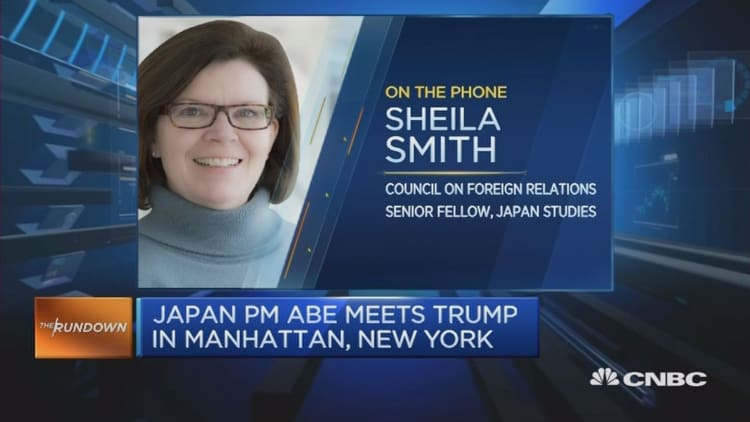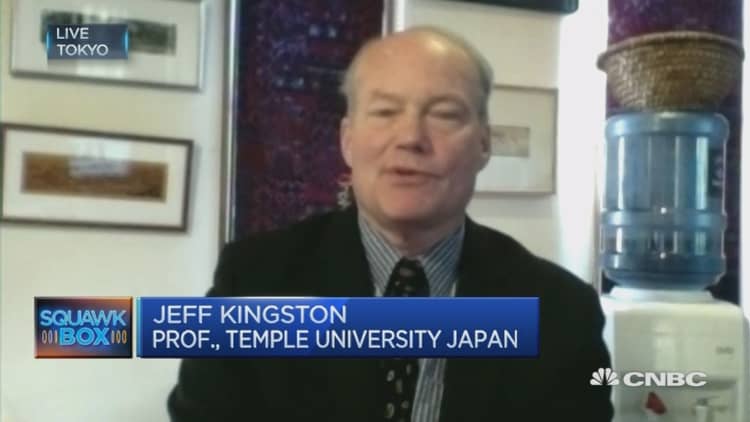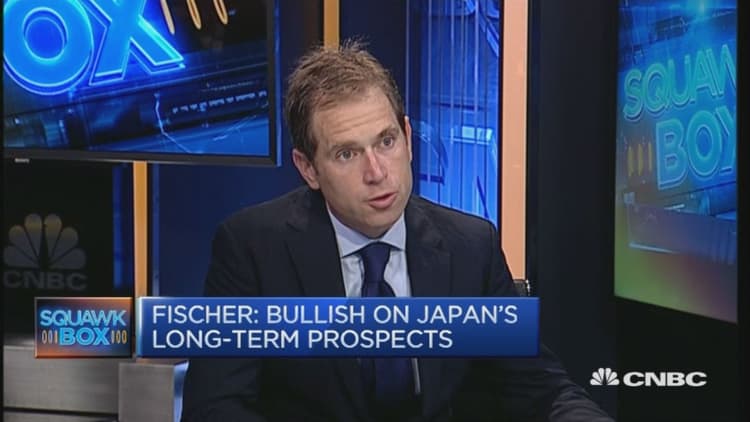
Japanese Prime Minister Shinzo Abe said on Thursday he was confident of building trust with Donald Trump following a meeting in which he sought clarity on campaign rhetoric from the U.S. president-elect that cast doubt on long-standing U.S. alliances.
After the hastily arranged 90-minute meeting at Trump Tower in Manhattan, Abe called Trump a trustworthy leader, although he said he would not disclose details of the conversation because the talks were unofficial.
The Republican president-elect will succeed Barack Obama on Jan. 20.
Speaking through a translator, Abe described the conversation as "candid" and "really, really cordial."
"I do believe that without confidence between the two nations, alliance would never function in the future, and as an outcome of today's discussion, I am convinced that Mr. Trump is a leader with whom I can have great confidence in," Abe told reporters after the meeting.
Asked by reporters about Trump's plan for force Japan and other allies to pay for U.S. military support, Abe replied, "I do believe without confidence between the two nations, alliance would never function in future, as outcome of today's discussion and convinced Trump a leader I great confidence."
He said he had agreed to meet again with Trump "at a convenient time to cover a wider area in greater depth." It was not clear if such a meeting would occur before Trump's inauguration.
Japanese Finance Minister Taro Aso told reporters on Friday in Tokyo that it was beneficial for Abe to meet Trump before the billionaire businessman became president, given that Japan-U.S. relations were vital to both countries.

The conversation came as Japan's leadership was nervous about the future strength of an alliance that is core to Tokyo's diplomacy and security. Abe and other Asian leaders were alarmed at Trump's pledge during his election campaign to make allies pay more for help from U.S. forces, as well as his suggestion that Japan should acquire its own nuclear weapons and opposition to the Trans-Pacific Partnership (TPP) trade deal.
Some of Trump's campaign rhetoric suggested an image of Japan forged in the 1980s, when Tokyo was seen by many in the United States as a threat to jobs and a free-rider on defense. The Trump adviser who spoke earlier in the week stressed a more positive view.
"Frankly, the prime minister has been more assertive and forthright in trying to make those changes to Japan's global posture," he said.
That was a point Japan acknowledged, with Abe adviser Katsuyuki Kawai telling Reuters that he had spoken to several Trump advisers and lawmakers and had been told that "we don't have to take each word that Mr. Trump said publicly literally."
Abe, who already faces domestic opposition to the U.S.military presence and the trade deal, has defended both.
Abe has boosted Japan's overall defense spending since taking office in 2012, while stretching the limits of its pacifist post-war constitution to allow the military to take a bigger global role. Defense spending still stands at just over 1 percent of GDP compared with more than 3 percent in the United States.
The United States is projected to spend $5.745 billion for U.S. forces in Japan in the current 2017 fiscal year. According to Japan's Defense Ministry, Tokyo's expenses related to U.S. troops stationed in Japan totaled about 720 billion yen ($6.6 billion) in the year that ended in March.
Temple University professor Jeff Kingston told CNBC's "Squawk Box" that Trump's campaign trail comments would have been "music to China's ears and very unsettling for Prime Minister Abe."
"Abe sees his agenda going up in smoke if Trump actually carries through on his campaign pledges," Kingston said.

Although Trump's advisers had since tried to undo some of the ill-feeling, saying that campaign rhetoric was not to meant be taken literally, some damage had already been done, which Abe was now trying to repair, according to Kingston.
"Many people in Asia think the Americans are unreliable allies," he said.
"Trump has reinforced that perception. He has also introduced a lot of uncertainty into diplomacy in a region where there is a lot of tensions, so I think Abe is there to show there is solidarity."
Analysts have said Abe would likely try hard to save the TPP deal.
"It has geopolitical implications for nations (that are) not China of the APAC joining together and in a way, a lot of people here see it as something of a (China) containment policy," Kingston said of the trade deal, which was eight years in the making.
"The U.S. buying out of that (will prompt) many people (to) see this as (the U.S.) ceding Asia as a gift to China and I think Abe wants to try to change that," he added.
Although Abe is the first leader of a major global economy to meet Trump, the President-elect would likely focus his first year in office on the U.S.-China relationship, Sheila A. Smith, a senior fellow for Japan studies at the Council of Foreign Relations, said, because relations with China informed U.S. foreign policy across Asia.
But the bigger picture was harder to see currently than usual, Smith said.
"There are larger questions here about what a Trump administration means for American foreign policy writ large," she explained.
"Is Mr. Trump going to be a more isolationist type of thinker when it comes to foreign policy? Is he going to pull back, become more protectionist in trade, not be so engaged in international agreements and multilateralism? Or is he going to move in a direction which is more traditional, a Republican-realist direction of building up more military strength, negotiating more unilaterally. We don't know," Smith told CNBC's "The Rundown".

